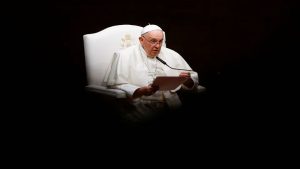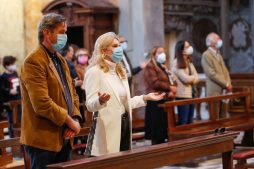The South African Catholic Archbishop Stephen Brislin, has described the late Pope Emeritus Benedict XVI as a man who respected Africa and respected its cultures.
Pope Benedict XVI died at his Vatican residence, aged 95, almost a decade after he stood down because of ailing health. Benedict was the first pontiff to resign in six centuries.
Benedict had cited his declining physical and mental health back in 2013 in his decision to become the first pope since 1415 to give up the job as head of the worldwide Catholic church.
The Vatican says the body of Pope Emeritus Benedict will be placed in St Peter’s Basilica from Monday for “the greeting of the faithful”. Archbishop Brislin says Benedict always encouraged peace in Africa.
“He gave very strong leadership in very difficult times- and I think particularly as Africans, we’re very grateful for his hopeful message that he always gave to Africa. He was no Afro-pessimist, he believed that the African church was a vibrant and young church, and held out enormous hope for the future. But he was also aware of the many conflicts that had been happening in Africa- and he tried to encourage us all to find ways of reconciling, ways of peace.”
Archbishop Stephen Brislin reaction to the passing of Pope Benedict:
Background on Pope Benedict XVI
Benedict XVI was born on the 16th of April 1927 in Germany. His original name is Joseph Ratzinger and prior to his election as pope, Benedict led a distinguished career as a theologian and as prefect of the Congregation for the Doctrine of the Faith.
Benedict’s father was a policeman and his mother a hotel cook. The youngest of three children, Benedict was six years old when the Nazis took power in Germany in 1933
His parents, staunch Catholics, were hostile to the regime. Benedict entered the seminary in 1939.
In 1941 he was compelled to join the Hitler Youth, and in 1943 he was drafted into the German military, serving in an anti-aircraft unit in Bavaria before being sent to Hungary to set tank traps in 1945.
He deserted in April of that year and was captured by American forces and held prisoner for a brief period.
His papacy faced several challenges, including a decline in vocations and church attendance.
And, divisive debates concerning the direction of the church, and the effects of the scandal beginning in the late 1990s surrounding the church’s handling of numerous cases of sexual abuse by priests.
Benedict was 78 when he succeeded the long-reigning and popular John Paul II in April 2005. His papacy was beset by Church infighting and outcry over paedophilia.
Apologising for scandals
He became the first pontiff to apologise for the scandals that emerged around the world and meeting with victims in person.
He also took key steps to tackling clerical child abuse, he was criticised for failing to end Church cover-ups. In 2013 he became the first pope to resign since Gregory XII in 1415.
His resignation created an unprecedented situation in which two popes – Benedict and his successor, Pope Francis have co-existed within the walls of the tiny city state.
His stint as Pope, the shortest in the history of the Catholic. The abuse scandal has returned to haunt him in retirement.
A damning report for the German church in January 2022 accused him of personally failing to stop four predatory priests in the 1980s while archbishop of Munich.
Benedict has denied wrongdoing and the Vatican has strongly defended his record. Pope Benedict XVI was not the first pontiff to visit the African continent. He visited several countries on the continent. – Additional reporting Reuters
Pope Benedict XVI passes on at age 95:






